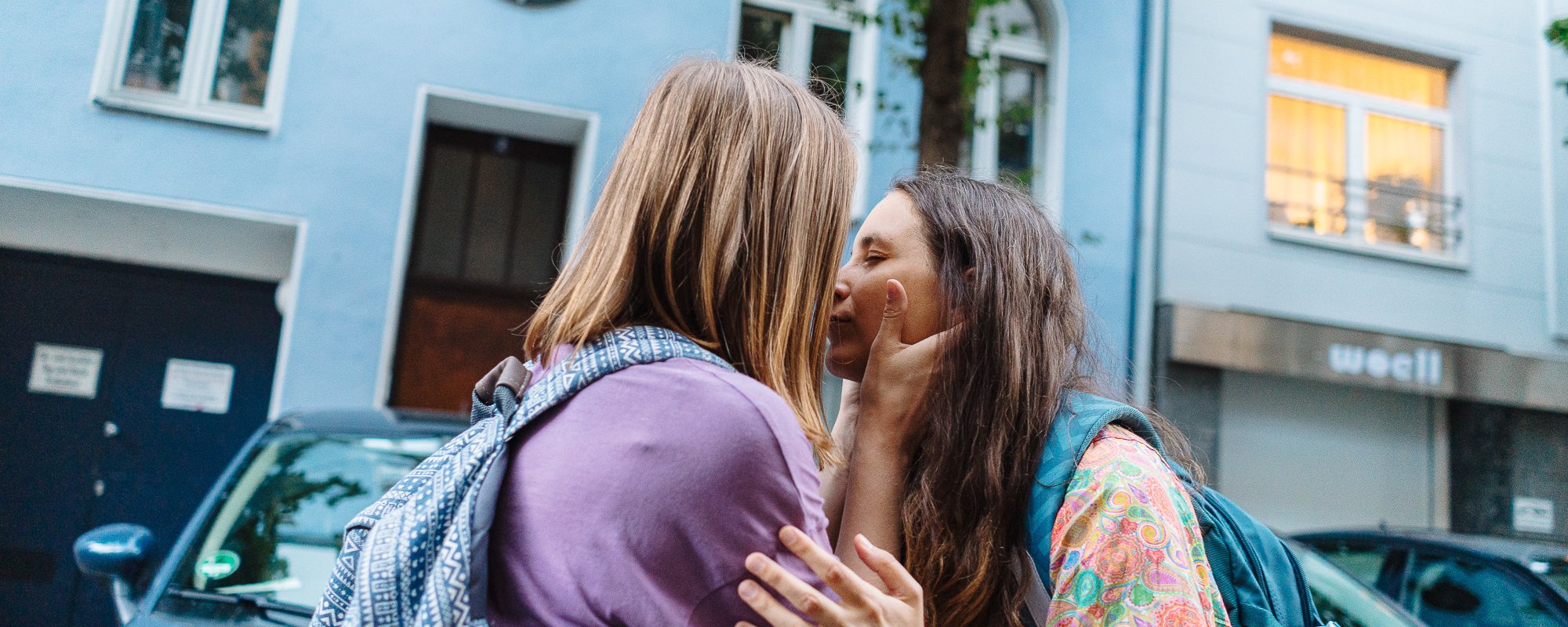Sasha Skochilenko leaves Pre-trial Detention Centre No. 5, where she has spent the last two years, gets into a paddy wagon, and a man in a police uniform takes her to another detention centre in the St. Petersburg suburb of Gorelovo. There they pick up the jailed activist Andrei Pivovarov, and so their journey from St. Petersburg to Moscow’s infamous Lefortovo prison begins. They will spend the next four days in its dungeons, where Sasha will finally get to her backpack with books on music and solfeggio. While all this is happening, her girlfriend Sonya and friend Lyosha search the capital’s prisons for her in vain. Then Russia releases Sasha and 14 other people from prison and expels them from the country. Sasha, Sonya, and Lyosha meet in Cologne, Germany. An OVD-Info correspondent asked them about what happened and spent an evening with them in Germany.
Plane trees are giant and sprawling, with sharp leaves and velvety fruit balls. There are many of them in the German city of Cologne. Sasha walks through the unusually buzzing city, turns to a park, carefully touches a trunk, puts her hand on it, strokes the bark. It is rough to the touch and warm from the August sun. A man in a wheelchair is sitting next to her.
He watches her, tries to say something, but she doesn’t understand German. Then he repeats in English: «It’s really cool that someone else in this city loves these trees».
«And I just started telling him everything!» Sasha waves her arms. «I say, like, I was a political prisoner for two and a half years, I just want to touch these trees! Usually people look at me like I’m crazy, but he understood».
Sasha was detained on April 11, 2022, after she replaced price tags at the Perekrestok grocery store with small anti-war labels. She touched a tree for the first time in over two years on August 3, 2024, 48 hours after the unprecedented prisoner exchange between Russia and the West.
«Nobody jumped for joy»
«I want that prison to come out of me», says Sasha. «You see, prison slang has settled in my head — it’s terrible. My tongue goes pale. Now I’m talking to you and I want to say not ‘cell’, but ‘hut’. Hut, hut, hut. Not ‘bed’, but ‘bunk’. Bunk, bunk, bunk. Maybe these words were created on purpose to create a distance between the ‘free’ words and what is happening here, so that we don’t forget that this is not home at all?»
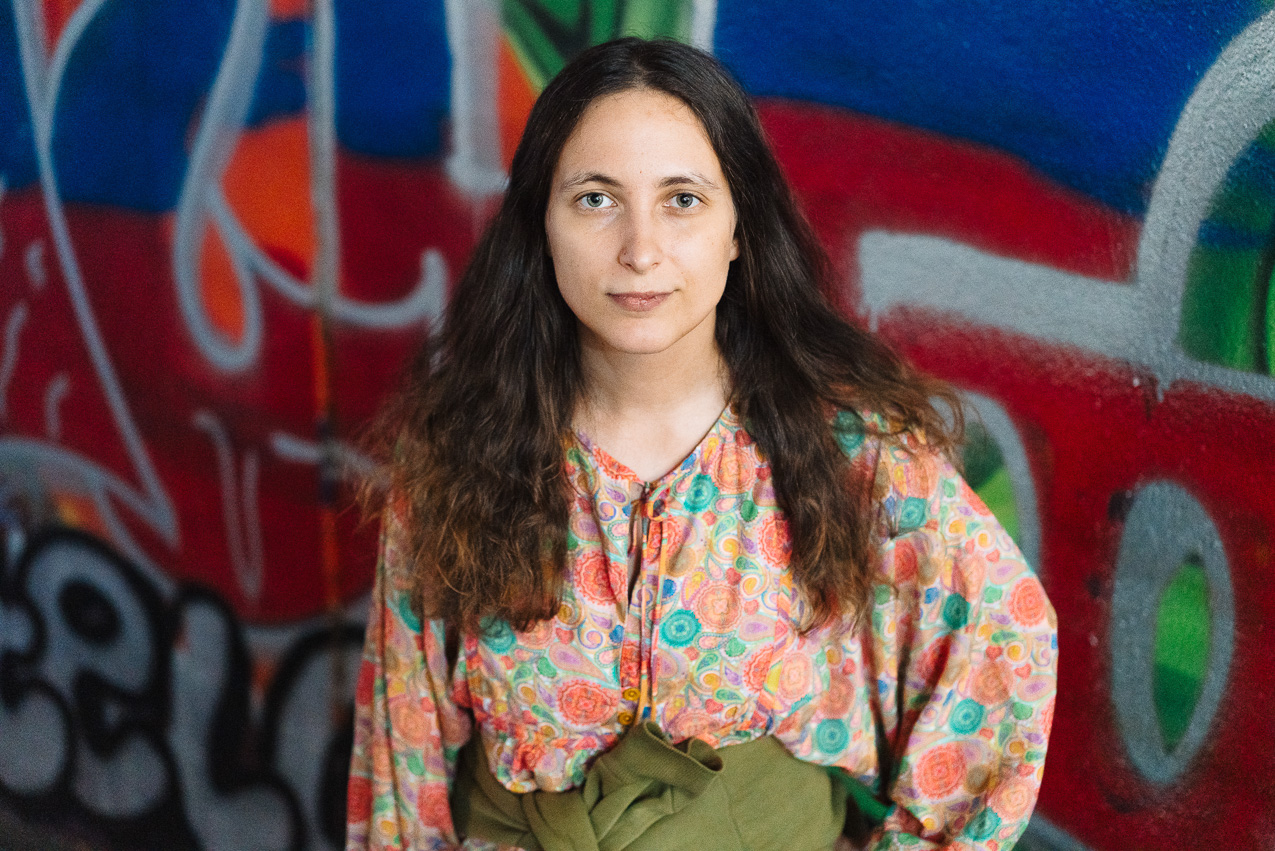
Sasha Skochilenko, Cologne, Germany, August 3, 2024 / Photo: Dasha Trofimova for OVD-Info
We walk along the noisy streets of Cologne. Sasha is wearing colourful bell-bottoms, sewn together as if from different patches of thick fabric. An olive-coloured sweatshirt girds her waist, and the sleeves of a loose, colourful shirt tremble from the broken movements of her arms. Friends and relatives sent her bright clothes to the pre-trial detention centre to support her. They also tried to ensure that Sasha could be given medications and food for a lifelong diet due to her gluten intolerance, as the state rations were not sufficient to follow it.
«I didn’t like all this talk about my health», Sasha admits. «I don’t like it, I don’t feel it, and I don’t want to feel like a sick person. But [talking publicly about illnesses] was my choice because it was my only chance. I was released not because I’m an exceptional person, not a fucking chance. But because all my relatives, a shitload of our friends, human rights organisations all came together and helped me make this story amazing, tragic, and touching the hearts of other people. I’m here thanks to ordinary people who have neither wealth nor power».
Next to Sasha, wearing a simple purple T-shirt and jeans, walks Sonya. Sonya has a very unusual voice: quiet and ringing at the same time. The girls walk close to each other, lightly brushing each other with their hands.
«When we got off the plane at Ankara airport and went to the welcome zone of the airport, nobody jumped for joy or was happy», Sasha recalls. «It was not like that at all, everyone was just in shock, some sat sadly. Maybe they were sad that they were leaving Russia. I was sad, too. I really appreciated that those who evacuated us, not knowing us, thought of us as people with trauma. They did not throw us to be torn apart by journalists after landing. They took us to a quiet place where they protected us from the press.
We arrived at the hospital (the former political prisoners flew to Cologne from where they were taken to the military hospital in the city of Koblenz — OVD-Info) late in the evening, and everyone really, really wanted to sleep, and I wanted to be left alone with Sonya. I am glad that my loved ones understood: I do not want to celebrate anything right now, but just to be with her».
At the hospital, Sasha started talking with Kevin Lik, the youngest person convicted of treason in Russia, who was also released for the exchange. A tall, pale young man with a short haircut and sharp cheekbones, he had remained in the black prison uniform much longer than the others. His mother is still on her way to her son, travelling from the remote Republic of Adygea in the Caucasus mountains.
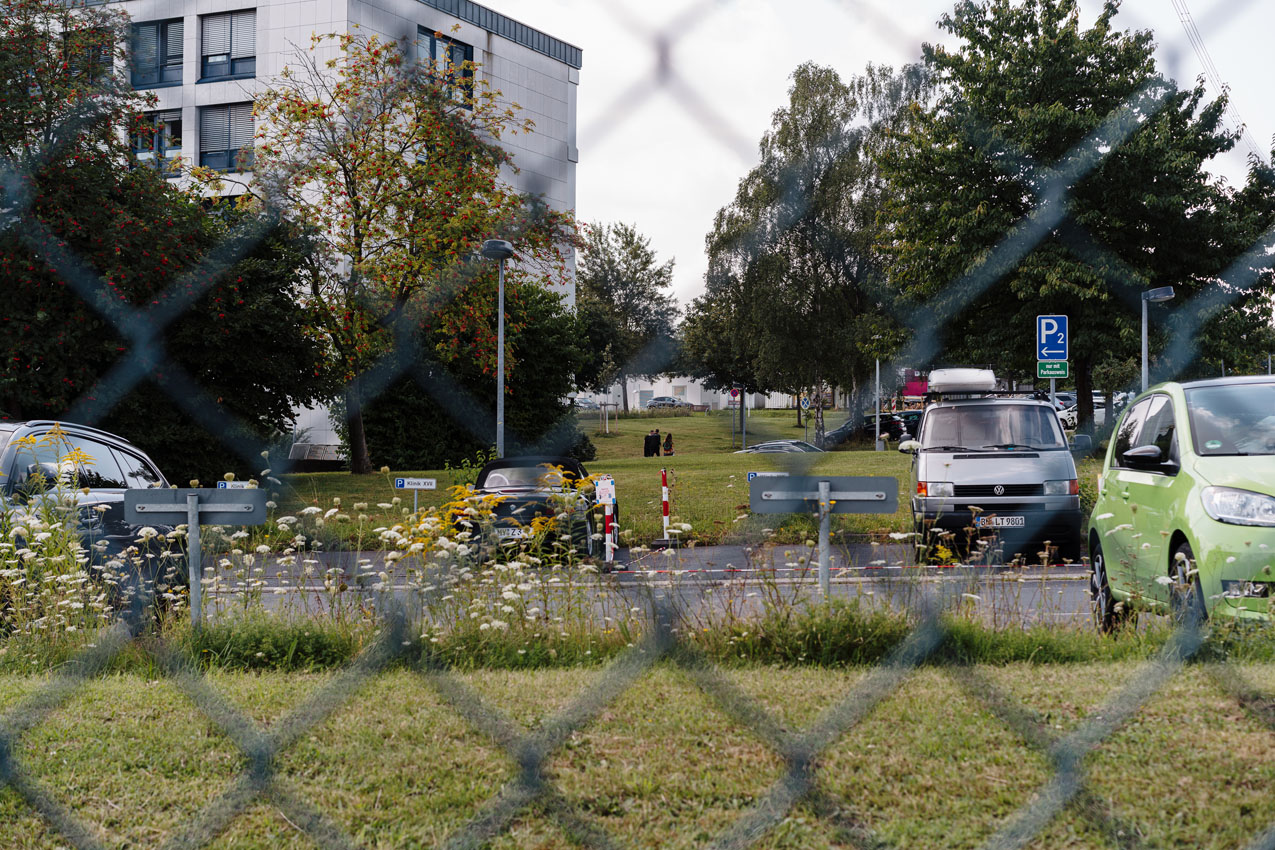
Sasha Skochilenko, Kevin Lik, and Patrick Shebel on the territory of the military hospital in Koblenz, Germany, August 2, 2024 / Photo: Dasha Trofimova for OVD-Info
Sasha also met Rico Krieger, a German medic who was sentenced to death in Belarus (and pardoned by Lukashenko, the country’s dictator): «He was very quiet, silently losing his shit».
«Some woman came to see us at the hospital», Sasha continues. «I saw a phone in her hands and said, „Listen, may I make a Telegram call?“ She helped me because I’d forgotten how to use all this stuff — it’s still confusing to me. Then it turned out that it was [opposition anti-corruption activist and the head of the investigation department of Navalny’s Anti-Corruption Foundation] Maria Pevchikh».
I was glad that they didn’t ask me to participate in the press conference. That’s not my cup of tea, I don’t do politics. First of all, I wanted to meet Sonya and call my mother. But there was no need to call my mom, because they — Lyosha, my sister and mom — all came from Paris together. We are exhausted, everyone is on the brink of a nervous breakdown; to put it briefly, everything’s so hard at the moment, so we are trying to spend more time by ourselves and rest».
Koblenz is a small and very pretty city in western Germany on the banks of the Rhine. It’s green and quiet. Sasha and Sonya want to go back there and spend some time away from big cities and intrusive attention.
«I’m in dire need of medical treatment, and they’re ready to provide us with help», says Sasha. «There are good psychiatrists and a therapist there, we had a crisis session with her — I really enjoyed it. Russian therapists tend to say, „I can’t imagine what you’re going through now’ or ‘I’m so sorry this happened to you“. But she was speaking to me differently. I spent a long time retelling her all the events of the day before the exchange. I was speaking in English, using the simplest words, because simple words are now best.
She asked me to clarify: «Did I hear you correctly that you were in very stressful conditions, without normal food, in the cold and in great fear?» Everything I had been telling for so long could be summed up in one sentence. The most important thing is to tell my story in a calm environment to a specialist, to say it out loud, say it over and over again when everything is already behind me»».
Sasha had a psychotherapist in the pre-trial detention centre — thanks to the help of friends and family, a specialist visited her from time to time. But it was impossible to overcome being surrounded by the walls of a detention centre, because the traumatising conditions were always there. The therapist helped to make things easier in the worst of moments, but any long-term work was out of question. Now such an opportunity has arisen.
«We didn’t live because we couldn’t»
A cyclist whizzes past us. Sasha shudders and flinches. After two years of isolation, loud spaces and sudden noises frighten her.
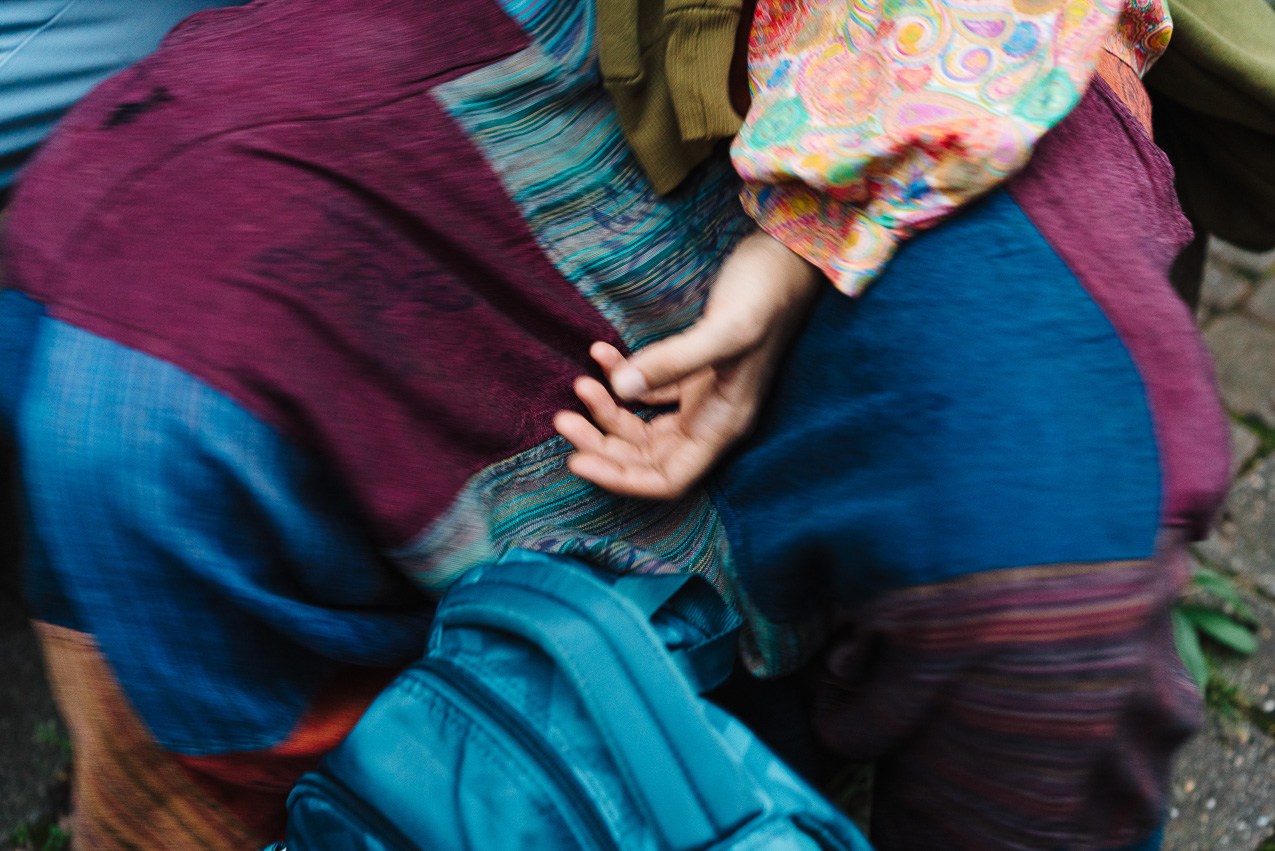
Sasha Skochilenko, Cologne, August 3, 2024 / Photo: Dasha Trofimova for OVD-Info
«I started sleeping with a night light. I’m scared even when the door is locked», she says, adding, «I think my family is more traumatised than me because my experience is my own, but if something like that were to happen to someone close to me, I’d be driven up the walls and worrying every day, like Sonya. That’s why I was so happy that she had the opportunity to go to Europe or Turkey and be safe for a while. But they all feel so guilty, as if they’re making excuses for the good things that happened in their lives. They say that their experience is incomplete without me.
And I was so happy that Sonya could relax; I asked her not to think about it. I wrote to her: take more rest, live your life. But we didn’t live at all, because we couldn’t, and now we all need to adapt to the new conditions. Of course, I have a feeling of guilt for troubling them, but I’ll talk about it with a therapist».
She says that the first 24 hours she spent in the temporary detention centre were one of the most difficult during her arrest. Then, already in the pre-trial detention centre, it became a little easier to survive the pressuring environment — her friends started smuggling coloured pencils and drawing tools to her through her lawyer.
The conditions in Pre-trial Detention Centre No. 5 were far from comfortable: the buildings were dilapidated and the interior was in shambles, with cobwebs hanging from the ceiling and fungus on the walls. Initially Sasha was placed in a strict regime cell for 18 people, with its own restrictions. For example, you could not comb your hair in the middle of the cell, but only squatting and at the door, and then gather all the hair. Then Sasha was transferred to the opposite cell, where, in her words, «it was also a mess, but my own».
«A prison has dozens of ways to break down personal boundaries», she says. «Direct aggression, toadying, pressure, familiarity. If you don’t know how to say no, everyone will take advantage of you and sponge off of you. Or they pressure you with sheer numbers: a bunch of men in uniforms, the human rights ombudsman, all our bosses suddenly pile up in there like a herd of elephants, and I feel so small in front of these men. Psychotherapy and antidepressants helped me [to hold on]».
When she was being transferred again, she thought it would be something even worse, but in the end Sasha ended up in a two-person cell. It was a «huge privilege», as there are only two such cells in the pre-trial detention centre. Now it is hard for Sasha to talk about the prison life that recently surrounded her, and she quickly asks to change the subject.
«I worked very hard, and that saved me», she says. «I gradually got different tools that you can’t keep in there. I wanted not only to sketch with a simple pencil and pen, but also to work in colour. You could hand on no more than six coloured pencils at a time, and one person could in fact keep only as many as six pieces».
But I got a shitload of pencils! I found a place to hide them. Then I got brushes, because they were watercolour pencils. I learned how to dilute ink from pens. I would draw a little on a paper and then dilute it with the brush — that way I could achieve different tones and work with light shading. Then I got an interesting blue liner — it’s a pen like a felt-tip pen, when you dilute its ink, it blurs psychedelically on the paper like a gasoline puddle. I was interested in working with the new tool.
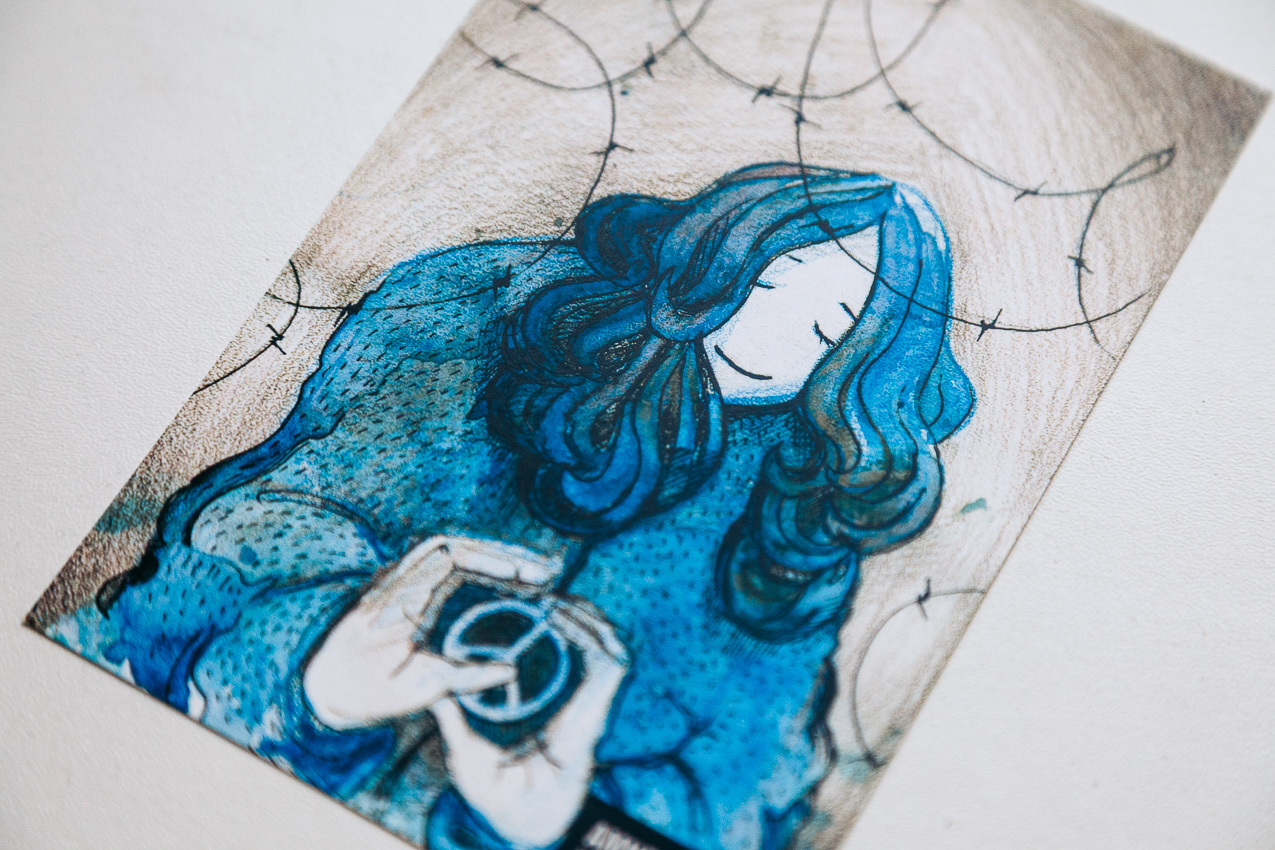
A postcard with a drawing of Sasha Skochilenko from the pre-trial detention centre, released by Amnesty International / Photo: OVD-Info
Then it got totally fucking awesome! One could pass you a blue pen and a purple pen, and they started passing me sets of cheap gel pens in different shades of purple, which you could also dilute and make big polygons of colour. Prison taught me patience and perseverance. I can now make a drawing with a level of detail down to every petal. I used to dream about it, but I couldn’t do it, and now it started coming so naturally. I did artwork for an exhibition and wrote texts. That helped my days fly by.
Some of the correction officers saw my pencils, but pretended not to notice. Generally speaking, the most badass thing you can do in a pre-trial detention centre is to talk about what happens there. Part of what happens there is normal and adequate to the circumstances. Yes, the conditions are fucked up, the food is fucked up, but some of the staff were even humane. They could sympathise, but only briefly, because they are not allowed to chatter with us very much. One of them once came up to me out of sight of the cameras and said: «I support you very much. If I could, I would do the same».
We are walking through the very centre of Cologne. Quiet, narrow alleys are replaced by noisy avenues, and when we pass by places with a lot of people and blaring music, Sasha wrinkles her nose slightly, as if the volume had just been blasted to the max. We go on and on, and she can’t stop going, but she admits that her legs aren’t used to this and get tired quickly.
«Let’s believe — it will help us hold on»
Sasha spent less than a week at Moscow’s Lefortovo pre-trial detention centre, right before the exchange. But despite the familiar routine, these days in solitary confinement without fresh air dragged on unbearably long and hard for her. She wasn’t allowed showers or walks, there was no proper food. She was lucky to have access to her medication. At that same time, Sonya and Lyosha were combing through detention centres.
«But everyone at the Five (St. Petersburg’s Pre-trial Detention Centre No. 5, where Sasha was held before — OVD-Info) already knew», Lyosha says. «Hell, they told me right at the information window, „She’s gone to Moscow“. Everyone sighed in relief. The judge probably threw a party».
During the last month, the detention centre staff constantly asked Sasha when the court would hear her appeal on her sentence. They wanted her to be gone from them as soon as possible. Rumours had reached Sasha that some wished her to «be gone to prison», the sooner the better. But most of them wished for her release.
«You see, no one told us about the exchange, no one at all», Sonya says, quietly. «And then, on Monday [29 July] Sasha got lost. We learnt of this from a woman who was in touch with our lawyer. She was writing letters to Sasha and to one of them they answered, „the addressee has left“ for a different institution».
«That same night Lyosha and I got tickets and arrived in Moscow. We were very afraid that Sasha did not have food and medicine. We bought everything and wanted to pass it to her, but at Lefortovo we were told that such and such wasn’t on their list. Luckily, Sasha did have her medicine, but she went without food for several days; she could eat none of what was offered.
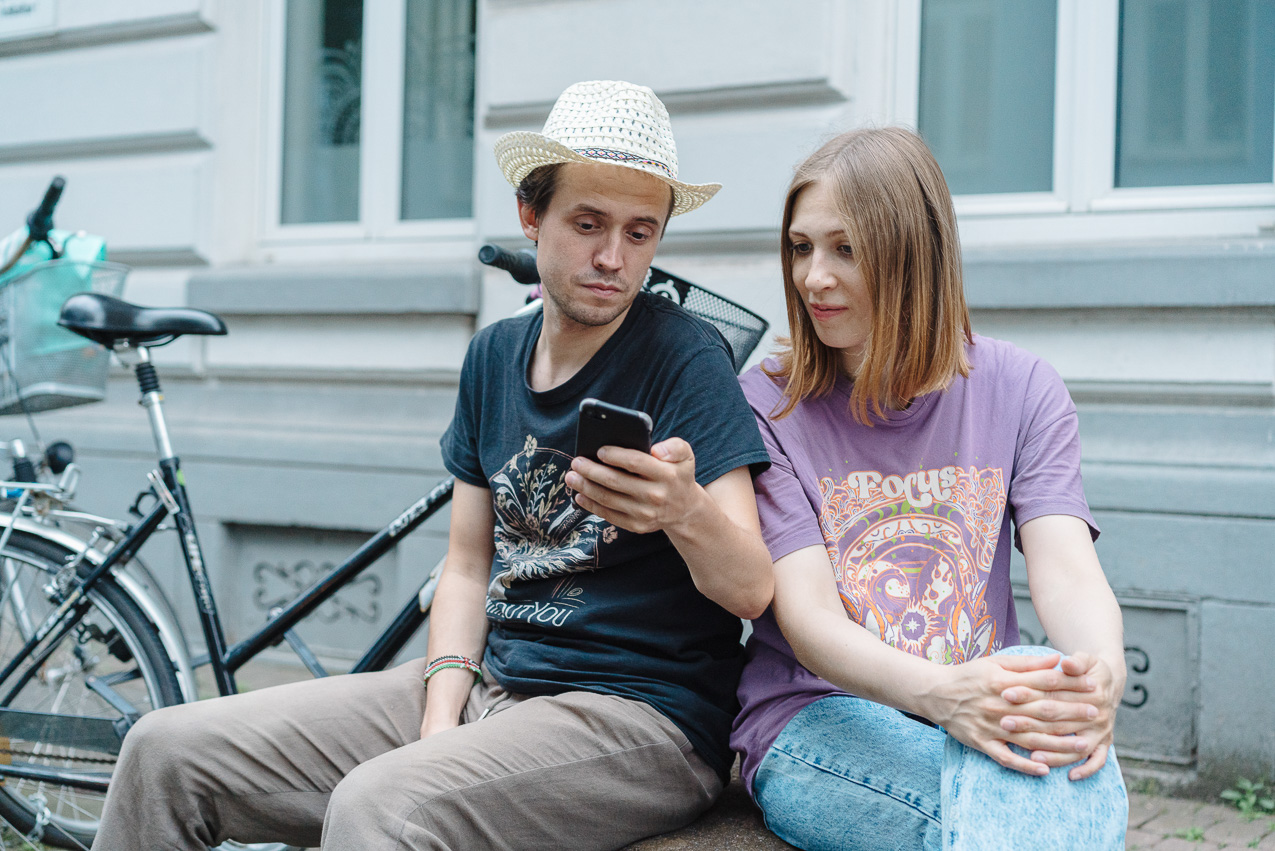
Lyosha Belozyorov and Sonya Subbotina, Cologne, August 3, 2024 / Photo: Dasha Trofimova for OVD-Info
We went to the women’s Pechatniki pre-trial detention centre, then to the other detention centres that have separate women’s departments — but she wasn’t to be found in any of those. We were confused. We decided that her paperwork just hadn’t been processed on that day yet. Tuesday came, and we started going around again. But she wasn’t to be found in any of those centres the next day, either».
That entire time, political prisoners kept going missing — every few hours news appeared in the media. Sasha was the fifth person gone missing. The more people went missing, the worse Sonya’s state got. On social media people were suggesting different theories, someone speculated that a special prison was being set up for them. News about the possible exchange started appearing on Tuesday. And a week before that, Sasha had been given a pardon application to sign.
«It was very strange», Sonya remembers. «I was visiting her on Tuesday, we were talking, and Sasha said how unbearable it was for her to think that she was going to spend four more years in prison and that she wanted to believe in some kind of miracle. I said to her: let’s believe — it will help us hold on».
Half an hour after I left, Sasha called back and said that they told her to write an application for a pardon, and to do so quickly. She did. Then we started thinking that it was some kind of setup. We even thought that they heard our conversation about a miracle and just decided to make fun of us — they thought, like, «we’ll give them a miracle».
But even after the news about a possible exchange broke, I was very scared. I wrote to [the editor-in-chief of a big Russian media outlet who chose to remain anonymous] — we know each other. He said: «Sorry for being so vague, but I think good news awaits you soon»».
«The sky in 3D»
A wooden log cabin. A fragile girl sits inside, her head bowed and her arms clutching her knees. The house is hugged by a green monster with empty eye sockets. It bends, squeezes the house with its long arms, and wants to get into the window with its scary white tongue. This drawing of Sasha’s is an allusion to a video by Canadian musician and animator Chad VanGaalen. She says that this picture very clearly describes the post-traumatic syndrome that she is experiencing right now.
«After leaving prison, I always know what I need right now, and I can do it very quickly, without being distracted by other things», she says. «In a physiological sense, I am very good at making decisions. In a psychological sense, not yet. I am still very vulnerable. My situation can be taken advantage of».
The first thing they did was go to a home appliance store. Sasha bought headphones and an adapter, and now she is looking for a wire to connect the instrument to the speakers. Sonya brought her a lot of electronic instruments. Sasha emphasises that she is not an activist, but an artist and musician. She talks about her idea of holding a lecture about prisons someday. So that she and the musicians could improvise together, and she would talk about her experience and read the texts she wrote in prison. And then they would turn off the sound, and everyone would plunge into silence.
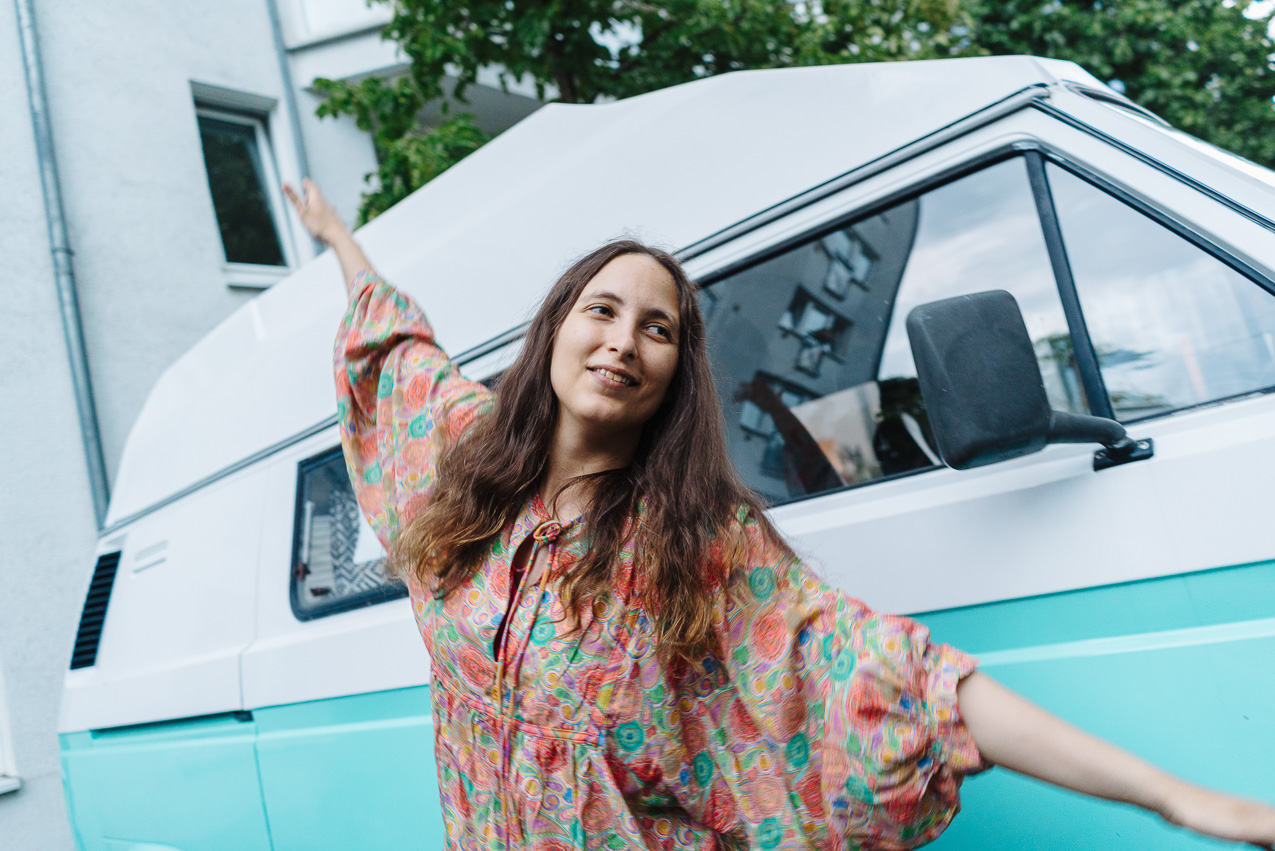
Sasha Skochilenko, Cologne, August 3, 2024 / Photo: Dasha Trofimova for OVD-Info
Sasha stops and begins to clap meditatively. The sleeves of her colourful shirt flutter and spread with her movements. One—two—three—four—five, one—two—three—four—five. The camera shutter clicks softly, and she flinches.
«I finally understood the quintuple metre. Those rhythms occupied my mind in Lefortovo», says Sasha. «It’s the only thing that saved me. Writing some tonality, calculating rhythms. When I first went to the pre-trial detention centre, I brought a shakuhachi flute, a bansuri flute, and a jaw harp. But all that was forbidden! I was immediately told it was contraband. And then they finally [before Lefortovo] gave me my contraband backpack. It had books on music, solfeggio, harmony theory, and two philosophical books about sound».
Just before her flight, Sasha managed to retrieve her instruments. When the plane took off, she settled in her seat, took out a flute, and started to play — for the first time in two and a half years, among former political prisoners and balaclava-clad officers assigned to them.
«I wasn’t playing the flute for [the officers]! I was playing for the window, for the tiny houses below the plane. Oleg Orlov said the melody was great. He’s as simple as I am, but in his own way. Of course, he’s older and has his own experience. We discussed what we saw out the window. Seeing the sky not flat but in 3D for the first time in a long while — that was something beyond imagination».
Though events unfolded quickly and Sonya knew nothing about the exchange until the last moment, having only two hours to pack, she managed to bring Sasha a flute, two analog monotrones, and a harmonica. Sasha lists the instruments she has played: piano, guitar, mandolin, domra, Japanese shakuhachi flute, and Indian bansuri flute.
«All these instruments, can you imagine, were given to me by other people; they just came into my hands: listen, I have a flute lying around, I don’t play it — do you want it? Sure, very much! And whatever came into my hands, I mastered. Now I have very few instruments with me, but that’s in a way cool because I can focus on each one of them».
«Of course, we will never be the same»
«Many of my fellow inmates were migrant women. We had a dermatologist; he was such a strange but interesting person. Very much like the singer Rozenbaum, bald and moustachioed. I didn’t understand why the fuck there was a dermatologist there, but then I got it: many inmates had taken methadone, and it leaves serious consequences on their skin. He had a sign with phrases in Tajik and Uzbek — like ‘hello’, ‘bye’, ‘take off your pants’, ‘strip to the waist’. I remembered another one — ‘God doesn’t want this’. I don’t know why it was there. Maybe [for such cases] when a woman comes and says, „I feel so bad, I want to die“».
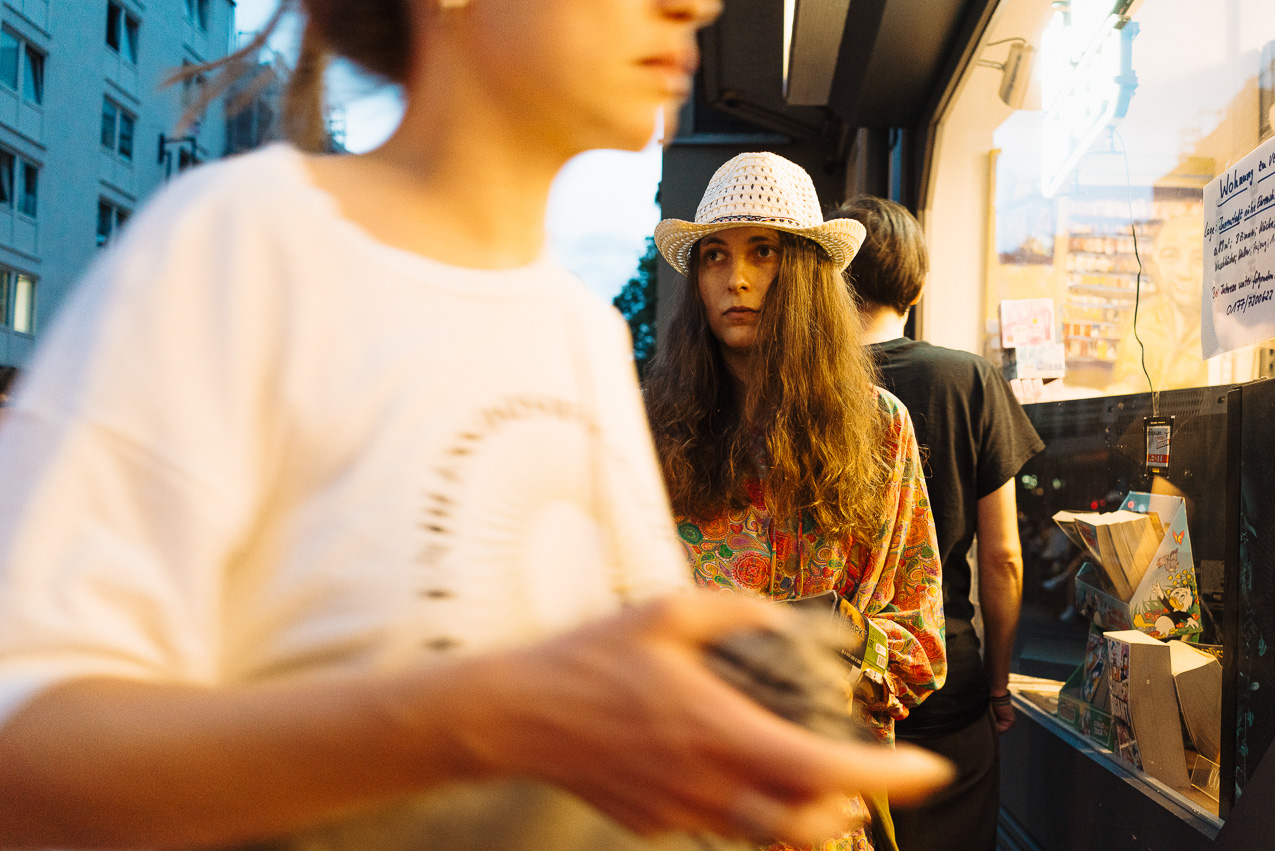
Sasha Skochilenko, Cologne, 3 August 2024 / Photo: Dasha Trofimova for OVD-Info
Sasha pulls a bag of tobacco from her backpack, plucks a fibrous lump with thin fingers, and spreads it on paper. Slowly, she rolls a cigarette and takes a long and thoughtful drag. She says that when the former prisoners were set free, they couldn’t get enough of smoking, and the first thing they asked their relatives, who rushed to them in the military hospital, was to bring them cigarettes.
She and Sonya are standing side by side, looking at an illuminated shop window. Lyosha walks off a little ahead, and they silently gaze at this shop window, leaning one against the other.
«I’m just happy that Sasha is free, that I don’t have to leave Europe anymore», Sonya says. — «I really wanted to leave [Russia]; it was a voluntary relocation. But [this] week was hard. I feared I would cry during our first meeting, but it didn’t happen. The others, who came with us, were crying. Now I feel as if all this is not real — as if we were watching a film about ourselves. You see, I can’t believe that Sasha is free because I expected it to happen only after four years. To be honest, I didn’t believe in any miracles».
Their relationship became public as the case against Sasha instantly became high profile, and she has never hidden the fact that she is a lesbian. Sonya says she didn’t mind this forced publicity, but she was a little afraid — for example, of the anti-gay campaigner Timur Bulatov. He used to denounce her and write insulting texts about Sasha and her on his social media.
«We haven’t hidden our relationship from the very beginning; that would have been uncomfortable for us», says Sonya. — I think it was much easier for us because we are women. If we were two guys, we would have been beaten up, and I was already a bit afraid that someone might get me. St. Petersburg is quite a liberal city, it’s relatively quiet and beautiful. I love this city and will miss it, and I will miss my friends as well. I packed my bags in two hours and didn’t have time to say goodbye to anyone. Maybe that’s a good thing because it would have been excruciating. And I was also afraid that Sasha would go to a penal prison in a small town. I felt pretty safe in St. Petersburg, but in a small town, it would have been scary».
Together with Lyosha and Sasha’s defence counsel, Rita Kislyakova, they imagined what would happen if Sasha ended up in a remote prison. They decided to travel to her on shifts.
«Now we don’t need to censor ourselves anymore, as we used to during prison visits or phone calls. Dreaming about the future helped us. We knew that we would have a great future ahead of us someday. How did we maintain the connection? We supported each other. Unfortunately, most women are either alone in prison or only needed by their mothers and grandmothers. I don’t like to differentiate between men and women, but it’s a fact: women often wait for their significant others, but men rarely do. There [in prison] are even related superstitions: for example, women often wear their underwear inside out — they believe that then their husbands will not leave them».
In the pre-trial detention cell, the cellmates told Sasha that Sonya would not wait for her and that they would soon break up. Sonya said that she had never even thought of such a thing. At the same time, for the first year after Sasha’s detention, she and Sonya practically did not see or speak to each other. Only at closed sessions on the measure of restriction for a few minutes a month, Sonya saw men in uniform escorting Sasha into the room and then taking her back out.
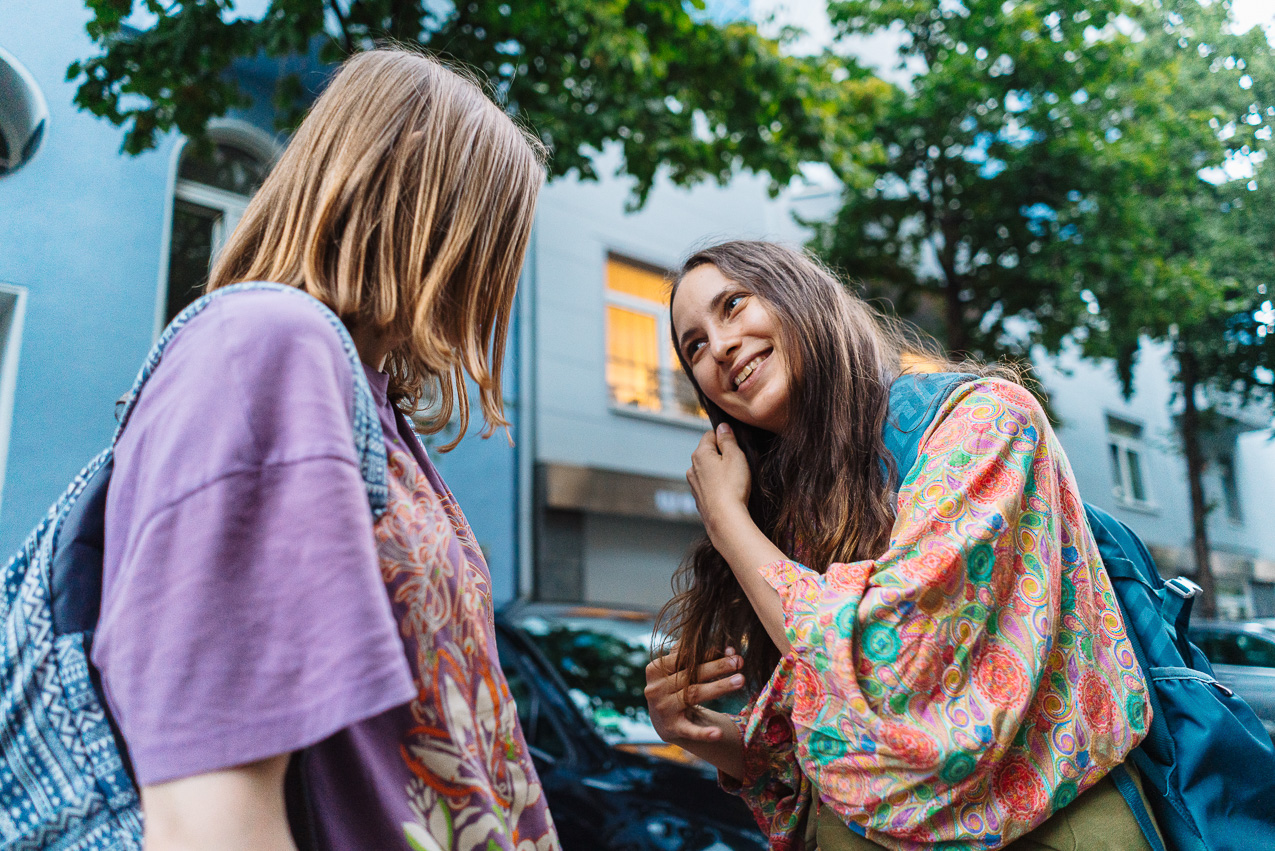
Sonya Subbotina and Sasha Skochilenko, Cologne, 3 August 2024 / Photo: Dasha Trofimova for OVD-Info
«We had a great relationship [before the arrest], so there wasn’t even a question of breaking up. Of course, it was very difficult, but this experience even brought us closer together. Because we lived together, I was made a witness in the case and was not allowed meetings or calls. I didn’t even know that Sasha wanted to leave those price tags [in the store]! She didn’t hide it from me, she just didn’t think it was a big deal. And the whole first year we only wrote each other letters through the Federal Penitentiary Service system. It’s very long and frustrating. After a year, when we were allowed visits and calls — we were so happy!»
Sasha and Sonya met each other online on a dating site for girls in 2017. One day, Sonya saw a picture of Sasha — she says she immediately thought that «this is not a girl, but a dream», and when she saw they had similar interests, she decided to write. Sonya admits that she thought Sasha would never pay attention to her, but it turns out that Sasha thought the same thing about her. In May, it was seven years since the girls had been together.
«Sonya and I are different, and I love it so much!» — says Sasha. «We balance each other out so much. I, for example, love to hoard things, don’t know what will happen to me now; maybe I, as a person who was penniless, will endlessly buy now that there’s money, but Sonya knows how to spend money and save it, she loves to throw things away. We’re a perfect couple.
We were afraid that if we started living together all at once, we would quickly break up, so we decided to get closer at a turtle’s pace — very slowly and reasonably. We managed to live together for two years before the arrest.
Before my arrest, I lived a very fragmented life. I was a journalist, a cartoonist, a free artist, and a musician. I really wanted to just escape from that world, forget about all those activists, forget about the elections. And then I met Sonya, who had completely different interests. We talked about the simplest things. I was living in a world of internal migration — for as long as possible, without noticing anything around me. And then I fell down the rabbit hole of the St. Petersburg underground. And all my identities during my imprisonment, they came together, and everything started to make a very profound sense».
«Then, on the day of the arrest», Sonya recalls April 2022, «Lyosha called me and told me that Sasha had been arrested for some price tags. I didn’t even understand what the price tags were, and neither did he [understand]. She was arrested in the morning, closer to the evening we found out what the price tags were; Sasha herself was able to call me only at 1 a.m. from her lawyer’s phone and told me that she could be imprisoned for [a term of] five to ten years. I started sobbing, I was absolutely hysterical, just in unbelievable shock. Before that, I had thought that this could be at most an administrative offence, what else could it be?!»
«I was very afraid that Sasha would never come back to me the same, because it is such a terrible experience, it is sometimes hard for me to even hear about it. I want to understand her, to share it with her, but sometimes it’s like I want to abstract myself, it’s so scary. You know, it’s inexpressibly terrible when there’s a trial, Sasha asks the judge for water, and the judge says, „No.“ And she just sits in a cage for hours with no water. And at one point, she broke into tears».
«You just see your loved one sitting in a cage, crying because she hasn’t had water for eight hours», Sonya’s voice trembles and her eyes turn red, but she quickly pulls herself together. «Of course, we’re not the same», she continues. «But Sasha looks the same and communicates the same. I’ve changed a lot, but I don’t know how much on the outside. It used to be hard for me to endure difficulties. But now I am very, very stress-resistant».
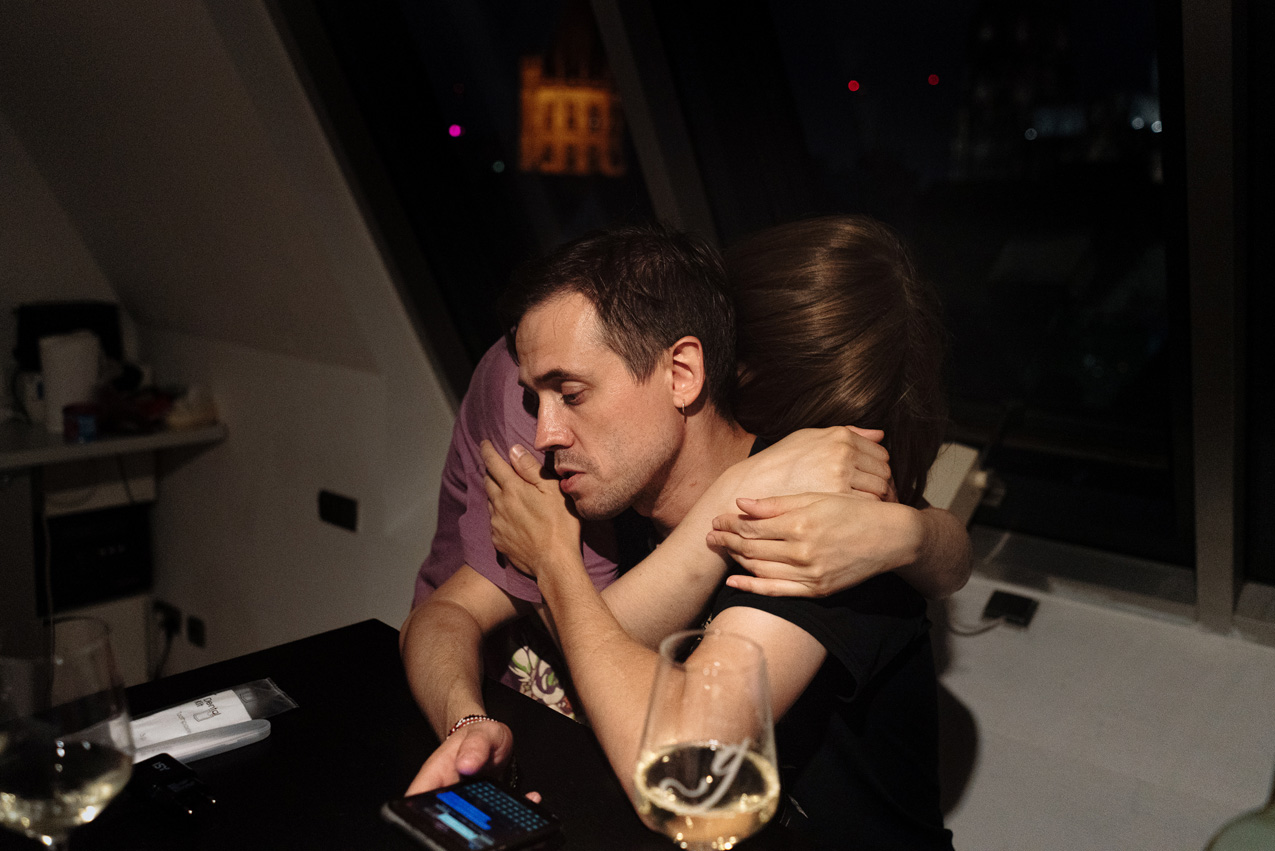
Lyosha Belozyorov and Sonya Subbotina, Cologne, August 3, 2024 / Photo by Dasha Trofimova for OVD-Info
«We went through a lot, but I think I am very lucky, because Lyosha, Sasha’s old friend, was with me, and he became my close friend as well. I talk to other women a lot — wives and friends of political prisoners, and they carry on all by themselves. I am amazed that during these two and a half years there have been so many articles on Sasha. That’s so strange, usually public attention shifts so fast».
«You had such a nice life before imprisonment!»
«On the first or second day of my imprisonment, my lawyer came to me, but I felt incredibly sick and wanted to cry», Sasha recalls. «I said: „I won’t survive ten years here, in this cell“. And she brought me a stack of photos, greetings, articles about me. At first, of course, I’m like: wow, holy shit, I’m popular — there’s an article about me on Wikipedia! But then there was so much of it. The thing you don’t get enough of is love. There’s just more and more of it and you always have enough, but it’s hard work».
The trial proceedings lasted more than a year and a half — 19 months. On November 16, 2023, Judge Oksana Demyasheva sentenced Sasha to 7 years in a penal prison. That morning Sonya woke up and decided that she would not cry in court. The hardest part was the four hours of waiting after Sasha’s final statement.
When the judge announced the verdict, Sonya could not bear it anymore and broke into tears. She went to Sasha, who was crying as well. Sonya recalls that she asked the guard for permission to hold Sasha’s hand, but he refused. Sonya simply stood by the cage.
«Then one of them grabbed me by the shoulders and roughly dragged me back», says Sonya. «And I screamed. I got hysterical. It was very embarrassing. It’s okay to cry but to scream! Very shameful, right, Lyosha?»
«No, why?» — Lyosha shrugs.
In the beginning after the trial, Sonya blamed herself, saying that Sasha was jailed because of her publicity. She also thought that the lawyer, Yury Novolodsky, who was always arguing with the judge and demanding her recusal, could have caused the judge to become harsher.
«It seemed like I was looking for reasons. Although the only reason was that the judge is [a very bad person]», Sonya doesn’t hold back. «This is terrible: the very next day after the sentence, she was recommended to be appointed deputy chairperson of the Kalinin court in St. Petersburg — this is the second most important position — a very high and very well paid one. The verdict was passed on Thursday, and on Friday she was already recommended — not on Monday, not a week later, but ostentatiously the next day.
Many people believe that Russia will change and those responsible will pay, but unfortunately I have little faith in that. The secret police who exiled people to the GULAG and tortured them did not pay. But I would like her to be punished because she abused Sasha. It’s not even just the sentence, but the fact that she is a sadist».
Sonya tells how she always tried to bring something sweet to Sasha in the detention centre — a cream that smells good, a brightly coloured comb or hair band, some unusual little things, something new and tasty that Sasha had not yet tried.
«It was hard for me that Sasha was not with me and was suffering so much», says Sonya. «I often went all over the city and bought something for her. There are very few impressions in prison, you see only grey colours there. But like this — bright things, delicious food — this is something you can diversify your life with. A brightly coloured comb, for example. Brightly coloured clothes, those we’ve always passed on».
«Sonya is a hero to me», Sasha says as we leave the guys to be alone. «All the women in the pre-trial detention centre told me how lucky I was to have her. Appreciate her, take care of her, you have true love. There is no homophobia in women’s prisons at all, at least in Pre-trial Detention Centre No. 5 I did not encounter it. If you tell them directly about your relationship, they say it’s cool.
One of my fellow inmates was a Roma woman from a very patriarchal environment. I tell her, look, I have a girlfriend. The first thing she asked was, «Do you want to do IVF?» I noticed that when you don’t hide it and talk about it very simply — here is a person, I love her, this is my Sonya — people react much better. When I showed photos of us together that she sent me, everyone said: «Wow, how cool». One Uzbek woman told me: «You had such a nice life before imprisonment!»»
And now I want to live here [in Germany], I want to integrate. Maybe to become useful through my art. This is the least I can do in exchange for my life. I am still in shock, and I am not in the mood to give interviews at all, because I need to rest and start dealing with the trauma. The time will come, and I will start talking about it — as I see fit.
«Let people not be offended by me. Others probably feel differently, but right now I want to get fucking lost somewhere, and that’s it. To live as if no one knows me — just to live my life, to enjoy it. To live as I dreamed».
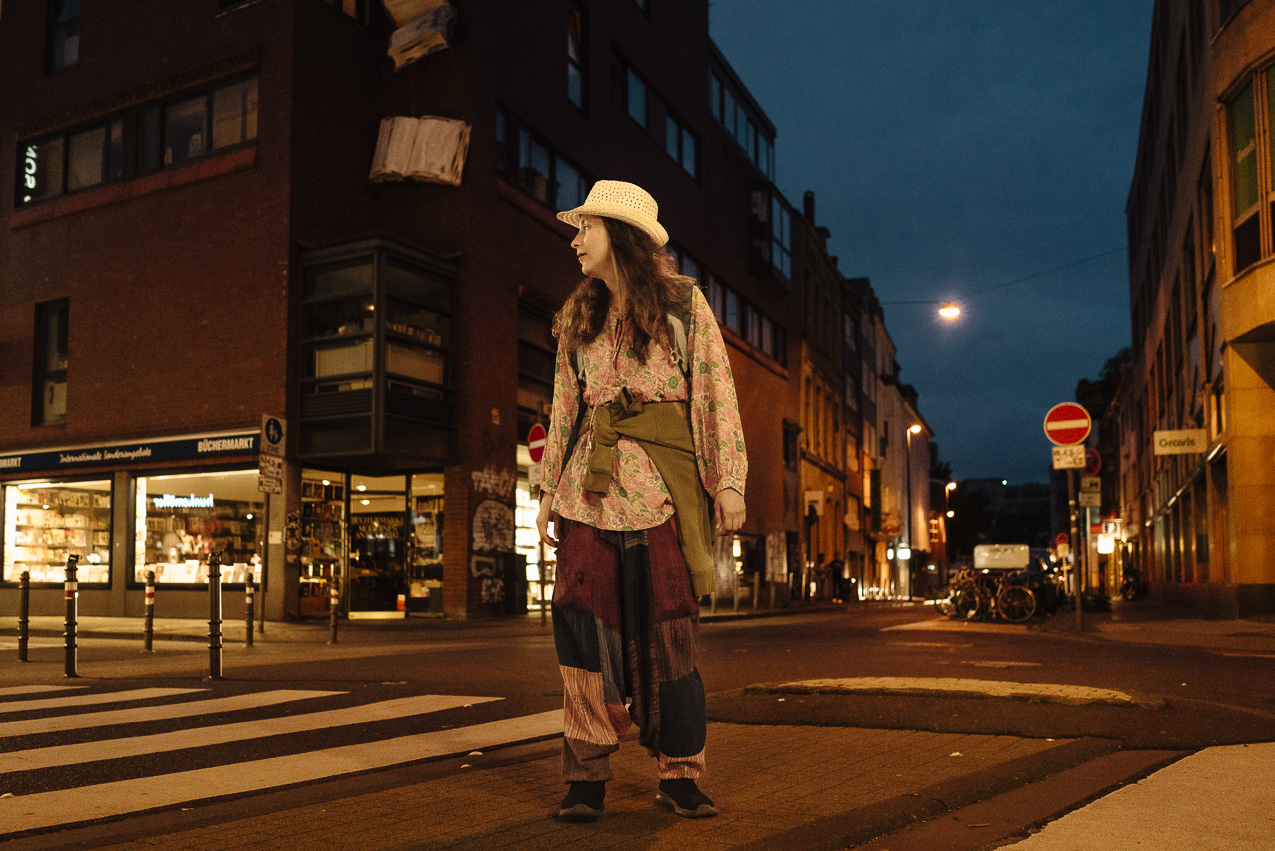
Sasha Skochilenko, Cologne, 3 August 2024 / Photo: Dasha Trofimova for OVD-Info
It got dark in Cologne. We raise our heads — light white feathers circle above us and slowly settle on the asphalt. Lights come on in the windows, shop windows flash, closed bars come to life. Sculptures of books, built into the wall of the house opposite, turn white.
«Fucking awesome», Sasha exhales.
«Yesterday we were walking together in the small city of Koblenz», says Sonya, coming up to us. «We really liked this place. We want to spend some time there at first, because Sasha really wants peace and quiet. We understand that now we have all the time in the world, and there’s no need to rush».
Marina-Maya Govzman



